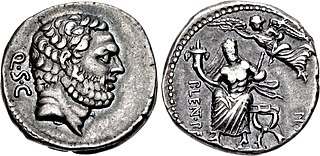Related Research Articles
Year 48 BC was a year of the pre-Julian Roman calendar. At the time, it was known as the Year of the Consulship of Caesar and Vatia. The denomination 48 BC for this year has been used since the early medieval period, when the Anno Domini calendar era became the prevalent method in Europe for naming years.

Publius Cornelius Lentulus Spinther was a Roman politician and general. Hailing from the patrician family of the Cornelii, he helped suppress the Catilinarian conspiracy during his term as curule aedile in 63 BC and later served as consul in 57 BC. Denied the opportunity to invade Egypt the following year, he nevertheless won some victories in his province of Cilicia and celebrated a triumph over it in 51 BC.
Publius Cornelius Lentulus Sura was one of the chief figures in the Catilinarian conspiracy. He was also the step-father of the future triumvir Mark Antony.
Lucius Cornelius Lentulus Crus was Consul of the Roman Republic in 49 BC, an opponent of Caesar and supporter of Pompeius in the Civil War during 49 to 48 BC.
Paullus Aemilius Lepidus was a Roman senator.
Cornelia was the daughter of Scribonia and her second husband. She was stepdaughter to Octavian through her mother's third marriage and half-sister to Julia the Elder, Augustus' only biological child.
Lucius Cornelius Lentulus was a consul of the Roman Republic in 199 BC with Publius Villius Tappulus as his colleague.

The gens Cornelia was one of the greatest patrician houses at ancient Rome. For more than seven hundred years, from the early decades of the Republic to the third century AD, the Cornelii produced more eminent statesmen and generals than any other gens. At least seventy-five consuls under the Republic were members of this family, beginning with Servius Cornelius Maluginensis in 485 BC. Together with the Aemilii, Claudii, Fabii, Manlii, and Valerii, the Cornelii were almost certainly numbered among the gentes maiores, the most important and powerful families of Rome, who for centuries dominated the Republican magistracies. All of the major branches of the Cornelian gens were patrician, but there were also plebeian Cornelii, at least some of whom were descended from freedmen.
Marcus Cornelius Cethegus was a Roman Republican consul and censor during the Second Punic War, best known as a political ally of his kinsman Scipio Africanus.
Publius Cornelius Scipio was a Roman senator active during the Principate. He was consul in 16 BC as the colleague of Lucius Domitius Ahenobarbus. He was also proconsular governor of Asia, probably around the years 8/7 BC.
Servius Cornelius Lentulus Maluginensis was a Roman statesman, who flourished during the reigns of Augustus and Tiberius. He was flamen dialis, and consul suffectus in AD 10.
The gens Apronia was a plebeian family at ancient Rome throughout the history of the Republic and into imperial times. The first member of the gens to achieve prominence was Gaius Apronius, tribune of the plebs in 449 BC. None of the Apronii obtained the consulship until the first century AD.
Lucius Cornelius Lentulus was a Roman politician and military officer who served as consul in 3 BC.
Gnaeus Cornelius Lentulus served as quaestor of the Roman Republic in 212 BC, curule aedile and consul in 201 BC. His brother Lucius Cornelius Lentulus was also consul in 199 BC. Gnaeus was possibly the son of L. Cornelius L. f. L. n. Lentulus Caudinus, curule aedile in 209 BC, though the presence of the praenomen Gnaeus, along with the absence of the agnomen Caudinus, are opposed to this connection.
Lucius Cornelius Lentulus Caudinus was a Roman politician in the third century BC.
Lucius Cornelius Lentulus Caudinus was a Roman politician in the third century BC.
Gaius Licinius Varus was a Roman politician in the third century BC.